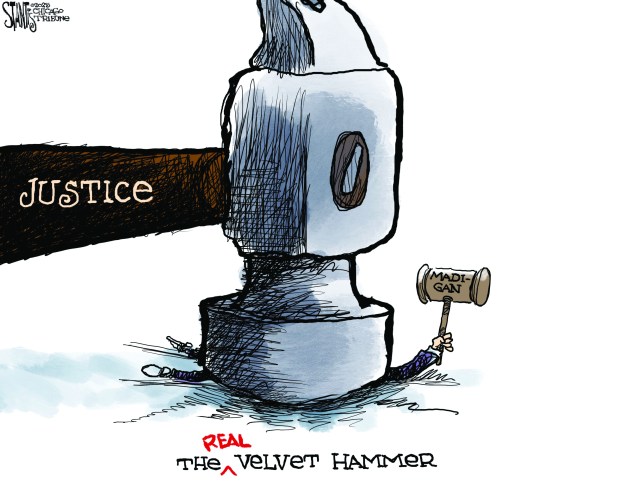Mr. Mayor, you’re cut off. Young Chicagoans can’t afford your lifestyle.
We young professionals know we can’t get bottle service at Bandit, fly to London to watch the Bears, and order the wagyu at Maple & Ash if we have credit card debt and the rent is due. But apparently, somebody needs to teach that lesson to City Hall.
Chicago is facing a $982 million budget deficit for 2025, fueled by improper spending of pandemic aid, excessive spending on the migrant crisis and an overall 42% growth in spending since 2019. Meanwhile, Mayor Brandon Johnson wants to hike property taxes by $300 million and take out a $300 million loan to send more funds to Chicago Public Schools. He says it’s draconian to make budget cuts, but when everyday Chicagoans overspend, we’re forced to tighten our wallets. City Hall must do the same.
Johnson needs to learn serious budgeting skills to correct the deficit. The true path forward includes curbing City Hall’s spending problem — not hiking taxes.
The city’s financial crisis is the result of years of poor spending decisions, but Johnson’s political inexperience has worsened it. The list of frivolous and wasteful expenses within his administration is startling. Johnson started his tenure with an $8,000 trip to the Grammys, recently blew through who knows how much money to watch the Chicago Bears play in London and spent $80,000 renovating his wife’s office in City Hall.
Then there’s the big bucks. A new fence for the Democratic National Convention set taxpayers back $814,000. Johnson greenlit $1 million in spending to build a now-defunct and toxic migrant site in Brighton Park. When he dropped the ball on extending ShotSpotter through the DNC, the temporary contract cost taxpayers $4.2 million. He spent $32 million intended for COVID-19 relief to restart a guaranteed income program that serves just 5,000 Chicagoans.
What’s most concerning is Johnson’s inability to find taxpayer-friendly solutions to bringing the budget back into the black. His official budget documents show the mayor has plans to pursue a congestion tax, graduated income tax, grocery tax, head tax, sales tax on services and property tax hike as possibilities for raising revenue for the city. Johnson even has revived his failed Bring Chicago Home initiative to raise the real estate transfer tax, which Chicagoans rejected 53% to 47% in March, as an option.
He should be thrifty. Instead, he’s downright reckless.
Then there’s his well-intended but poorly executed efforts to implement a hiring freeze that canceled two months of police academy classes and ordered layoff lists to cut $75 million in police spending. The Chicago Police Department already has 1,600 fewer officers than in 2019. That left the city with a $293 million police overtime bill last year. Chicago could restaff half of those full-time police positions and still save roughly $83 million annually, according to estimates from the Illinois Policy Institute. The institute’s polling shows Chicagoans want more CPD officers, not fewer.
Other mismanagement includes spending more than $112 million on CTA private security contracts for 400 unarmed officers and canine units that act as ineffective “deterrents” and $200,000 on a mysterious “(artificial intelligence) gun detection program,” which could yield civil rights lawsuits.
The city should reevaluate those contracts and reallocate funds to hire one CPD officer for every CTA train station. This way, officers could actually handle threats and help individuals feel safe on the CTA; as a bonus, it could cost taxpayers just $20 million annually, the institute estimates. That feels like a better use of funds than the roughly $40,000 the CTA spent on a DJ.
And all of these reforms should be coupled with fully implementing the court-ordered consent decree to improve training and curb misconduct. We need to stop the flow of litigation and injustices, which have cost the city $81 million in 2023 alone.
Instead of adopting some of these ideas, Johnson will plug the hole with a $300 million property tax increase, raising the tax on the typical Chicago homeowner by roughly $228, according to institute estimates. That would be bad for the city and undoubtedly be passed on to young Chicago renters, who have already seen their rents rise 24% since May 2021.
With few options for young adults, the city risks further brain drain. It is already losing some of its best, brightest and wealthiest, leaving the city population at a low not seen since 1920.
Going forward, Johnson should focus on implementing his “Cut the Tape” initiative to improve housing affordability by building more additional dwelling units, and scale back unnecessary government regulation, such as parking and aesthetic requirements, that stifle growth and development. The simple economics: Housing growth would expand the tax base; a property tax would worsen it.
There are better options to help save the city money than what Johnson is pursuing. If city leaders are brave enough to embrace meaningful spending cuts and creative solutions, Chicago can continue to be a city that fosters and supports the fiscal well-being of the next generation.
We expect financial prudency from those in their 20s. Why would we accept less from a city that is 187 years old?
Micky Horstman is the communications associate for the Illinois Policy Institute and a social mobility fellow for Young Voices.
Submit a letter, of no more than 400 words, to the editor here or email letters@chicagotribune.com.



